Why exercise over 50? Let me explain my top four great reasons
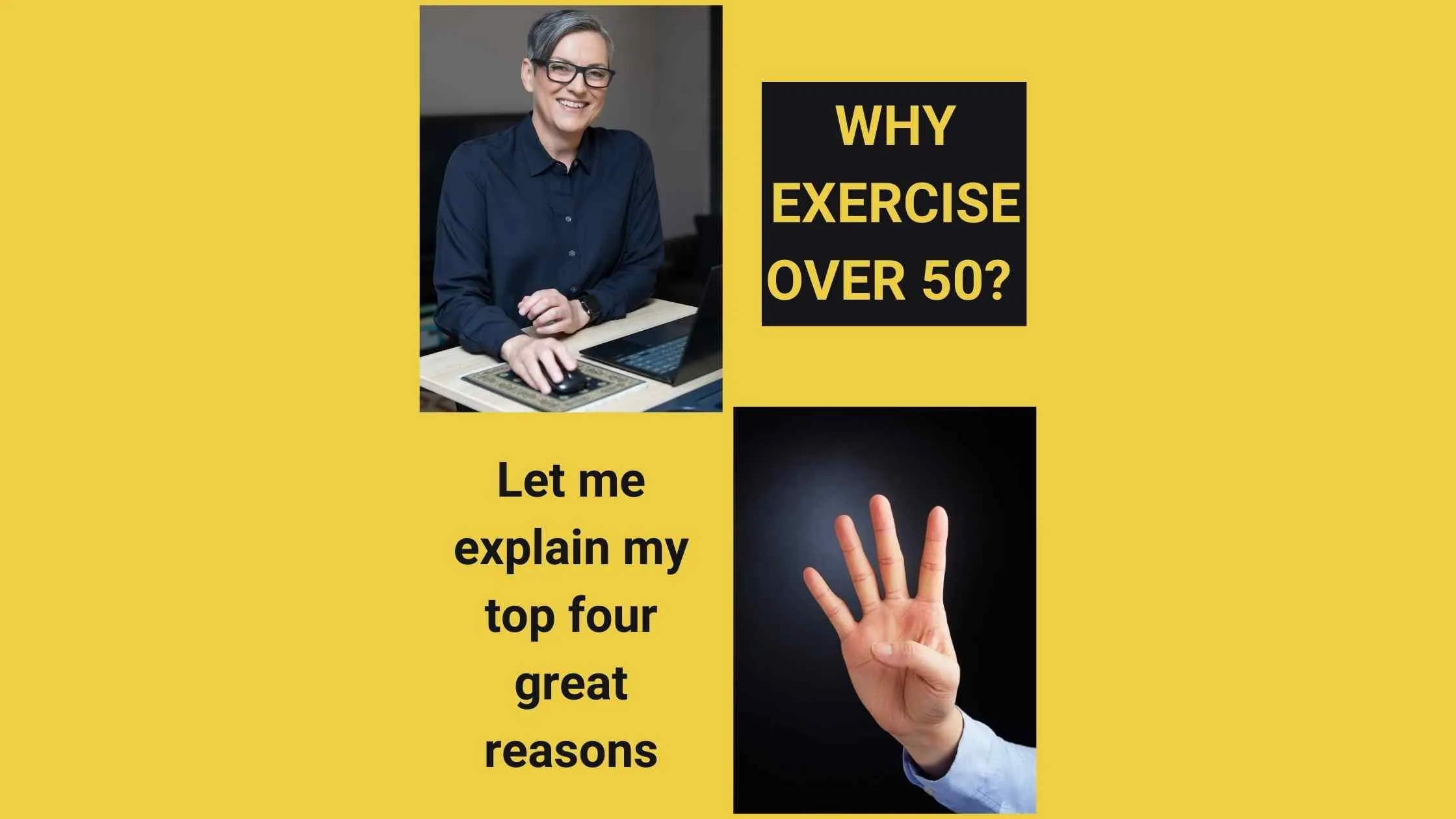
Why exercise over 50?
There’s loads of information out there about why we should exercise, but I’ve distilled it down to just four great reasons.
Half of these relate to the well-known benefits of exercise for our health and mobility.
But the other half boil down to how exercise can make us feel.
My top motivation for exercise is feeling great – both physically and mentally – and I let those other concrete benefits that we all know about just take care of themselves.
Read on to explore what I believe to be the top four reasons for exercise over 50.
My hope is that one or more of these will spark your motivation to give exercise a try.
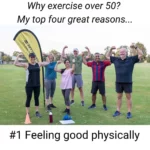
1. Feeling good physically
There are two aspects to this benefit.
Firstly:
- A general feeling of greatness and having energy to do stuff
I know this is an ill-defined benefit, but you will know what I mean if you are already an exerciser 😊
You just feel good, like you’ve got plenty of energy and life is better.
Secondly:
- Having the endurance and strength to do things you enjoy
What is your favourite physical activity?
Is it cycling, hiking, golf, swimming, paintball skirmish, or something else?
Many people think that their pastime is plenty of exercise, but most people could benefit from adding strength and endurance training.
Furthermore, improving strength and endurance will boost your performance and enjoyment of the activity too.
A personal trainer can target your programs to help you improve and be able to keep it up as you get older.
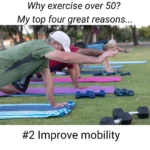
2. Improving and maintaining mobility
What limits your mobility in daily life?
Here are some of the things I’ve heard from both clients and friends of mine.
- Crook back
- Stuffed knees
- Bad shoulder
- Dodgy hip
- Stiff neck
- Old footy/netball injury
If you’ve got anything that limits your mobility, please get a diagnosis and treatment.
Then consult an appropriate health professional for rehab.
It’s often a physio who can help with your limiting injury/condition.
A physio will always prescribe exercises and a personal trainer can help you implement them and incorporate variations and progressions in your programs.
I can’t stress the importance of maintaining mobility enough.
Many of us have witnessed our parents lose mobility with age.
It’s heartbreaking and preventable.
Do you want to stay mobile and have good physicality in older age?
You know, if you fall, you need some strength to get yourself back up and maintaining mobility can prevent falls occurring.
Okay, so talking about fall prevention is a little heavy so let’s focus on staying mobile just for better quality of life now and as we get older.

3. Improve health
It’s general knowledge that there are numerous benefits to health from exercise.
Maybe your doctor has told you that you should exercise because one or more of the following have come up at your check-up.
- High blood pressure
- Elevated blood cholesterol
- Signs of diabetes
- Stress
- Osteoarthritis
- Risk factors for or family history of a medical condition
Improvement in general health now is a great reason to exercise and we can take better health into our older years.
Here I go again, that means better quality of life for longer.

4. Feeling good mentally
The mental health benefits of exercise are becoming more well known.
Exercise releases hormones in the body that make us feel good – enhancing a sense of wellbeing.
Having a regular commitment to exercise forces us to take time out from our demands and the physical activity is a great stress release.
Joining a group activity can facilitate connection with others and a sense of community.
I believe that exercise contributes to self-esteem.
Adherence to fitness plans along with those feelings of achievement and satisfaction after exercising all contribute to feeling good about yourself.
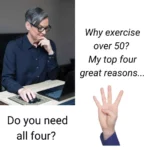
Do you need all four?
I personally gain benefits in all four of these areas from my exercise routines.
My favourite physical activity is running.
It makes me feel energised both physically and mentally, and I know there are heaps of benefits to my health from running.
The reason I do resistance/weight training is to keep my body strong for running.
I know that resistance training has other benefits and I love feeling strong, but strength for running is my main motivation.
If I’m injured or my osteoarthritis has flared up, I always seek diagnosis, treatment, and rehab from an appropriate professional and do what I need to do to get back to my peak.
All of this will help me age healthily with good physicality.
Like many of you, I’ve been through some tough times recently.
I reckon that exercise is my number one stress reliever and the benefits to my mental health are equivalent or greater than the benefits to my physical health.
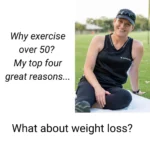
What about weight loss?
You may be wondering why I have not included weight loss as one of the ways that exercise can help people.
This is because exercise does not help with weight loss.
I wrote about this in a previous article and you can find it here if you missed it.

Have I missed anything?
Do you think I’ve covered all the ways exercise can help over 50s?
Let me know if you think there is a gap.
Keep in touch
Please reach out to me if anything in this article resonates with you.
You can email me at kate@fiftyfitness.com.au or connect via social media.
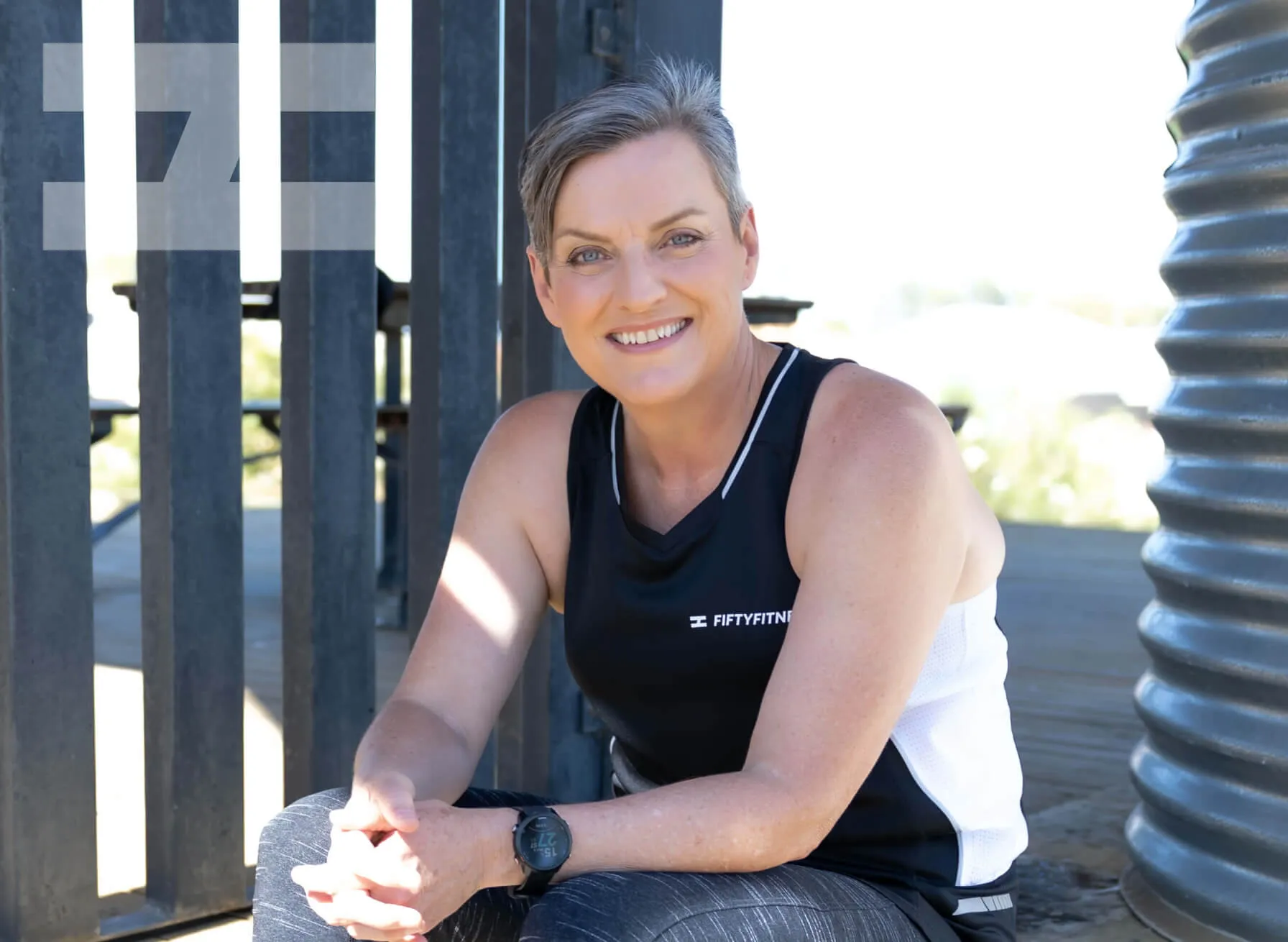
Subscribe now
Blog Subscription Form
A blog subscription form, used for the blog page and posts.
"*" indicates required fields